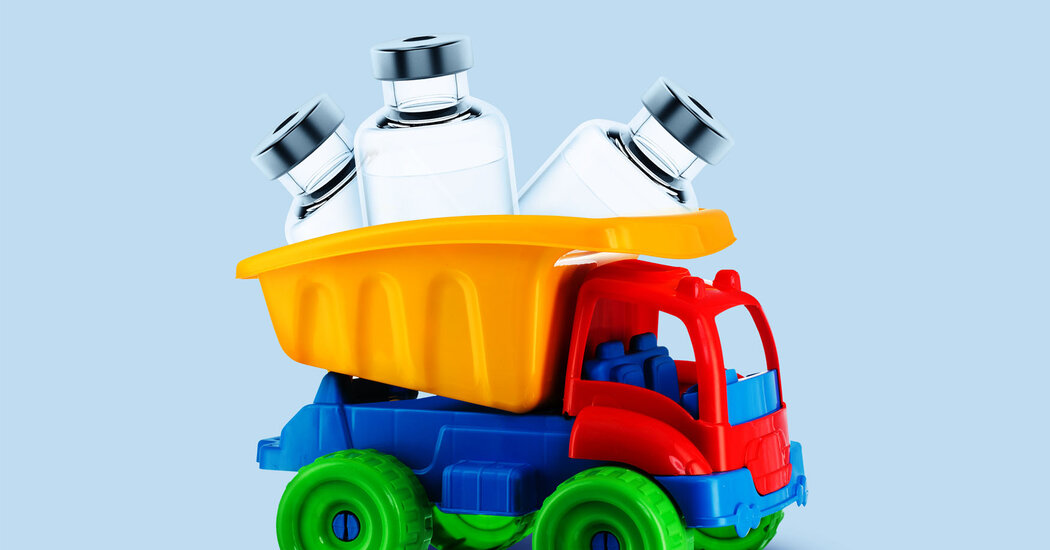Millions of U.S. parents — including many of my friends with children under 5 — are crossing their fingers again this week that Covid-19 vaccines will soon be available for younger age groups. An advisory panel to the Food and Drug Administration voted unanimously on Wednesday to recommend that the agency authorize the Pfizer-BioNTech and Moderna vaccines for use in very young children.
On Friday and Saturday, a Centers for Disease Control and Prevention advisory committee will meet to finalize their recommendations. After multiple delays in the review process of Pfizer’s vaccine, pediatricians are hopeful that both vaccines will become available early next week. The Pfizer vaccine would cover children aged 6 months through 4 years old, and the Moderna vaccine would cover children aged 6 months through 5 years old. Five million doses of each vaccine were made available for pharmacies and other medical establishments to order starting two weeks ago, so if the vaccines are authorized, they will be ready to go into arms immediately.
Understandably, many parents of young children have questions about the vaccines and the expected rollout. I talked with three infectious disease pediatricians to get answers.
How do the Moderna and Pfizer vaccines differ?
The Moderna vaccine is likely to be authorized as two doses spaced four weeks apart, said Dr. Debbie-Ann Shirley, a pediatric infectious disease physician at the University of Virginia. Pfizer will most likely be authorized as a three-dose series, with the first two shots spaced three weeks apart, and the third shot given at least eight weeks later. (Pfizer’s third shot is not considered a booster. It’s likely that Moderna and Pfizer will eventually authorize an additional booster dose for young children.) Both vaccines are at lower doses than the vaccines given to older kids and adults, and for young children, the Pfizer vaccine provides a lower dose than the Moderna vaccine.
The C.D.C. is still deciding on when kids will be considered fully vaccinated, but it’s likely to be two weeks after their final dose, Dr. Shirley said.
Preliminary data released by Moderna in April suggested that two shots were 51 percent effective at preventing Covid-19 infection among kids aged 6 months through 1 year, and that two shots were 37 percent effective at preventing infection among kids aged 2 through 5 years. Pfizer’s three-dose series was found to be 80 percent effective at preventing Covid-19 infection among kids aged 6 months through 4 years old, although that estimate is based on a small number of children who received the third dose. Kids — especially those under 2 — will be at least somewhat protected after getting the second dose of the Pfizer vaccine, too, Dr. Shirley said.
What are the side effects of the vaccines in young kids?
The data so far suggest that the side effects in younger kids are milder than those in older kids, probably because a lower dose of the vaccine is given, Dr. Shirley said. Among children under 5, “the side effects were the sorts of things that we might expect in children after receiving a vaccine,” she added, including increased fussiness, sleepiness and pain at the injection site. Comparing the two vaccines, Pfizer’s resulted in fewer side effects overall, probably because it uses such a low dose.
No children in the vaccine trials developed heart issues like myocarditis, a form of heart inflammation that was seen in a small number of older children who received the vaccine, Dr. Shirley said. It’s possible there will be some cases once the vaccines are given to enough kids, but experts don’t expect to see a significant number, because myocarditis “occurs more frequently in teenagers and young adults than younger kids,” said Dr. Ibukun Kalu, an infectious disease pediatrician at the Duke University School of Medicine. “I would not expect high rates of vaccine-related myocarditis in the under 5s,” she added. Dr. Kalu also pointed out that the risk of myocarditis is much higher among kids who catch Covid-19 than it is among those who get the vaccine.
It’s important to note that when the F.D.A. did not authorize the two-dose Pfizer vaccine back in February, that was because it didn’t work well enough, not because of any safety issues. (And that’s ultimately why the vaccine now has a three-dose regimen.)
Should your child get vaccinated right away if they’ve recently had Covid-19?
According to the C.D.C., kids who recently had Covid can get the vaccine as soon as they are out of isolation and are feeling better, Dr. Kalu said. But because “reinfection appears to be rare after the first few months of recovering from a Covid infection,” Dr. Shirley added, it’s not unreasonable to wait up to 90 days after the infection before getting them vaccinated.
Still, you may want to get them the shot sooner if cases are climbing in your community, if you’re traveling to areas with high Covid rates, or if your child is immunocompromised or has underlying risk factors, Dr. Shirley said. If you’re not sure what to do, “reaching out to a trusted health care provider is always a good way to talk through some of those issues,” she added.
Can my child get the Covid-19 vaccine and other vaccines on the same day?
Yes. According to the C.D.C., kids 5 and over can get Covid-19 vaccines and other inoculations, including flu vaccines, at the same time. Experts don’t anticipate this recommendation will change for children under 5.
Covid-19 symptoms are often mild in young kids, and they can get the virus even if they’re vaccinated, so what’s the point of vaccinating my young child?
It’s true that Covid-19 is far less risky for kids than it is for those who are older. But more than 440 children aged 4 and under have died from Covid-19 since January 2020, and the infection is “one of the top 10 causes of death in children in the United States,” Dr. Maldonado said. Also, Covid-related hospitalization rates are higher for children 4 and younger than they are for older children, and more than half of pediatric hospitalizations among kids ages six months through 4 years occur in children with no known underlying risk factors. “I’ve had a number of friends who are health care providers whose children have wound up in the hospital, some on oxygen in the I.C.U., who have no risk factors,” Dr. Maldonado said.
“Vaccines are the most effective way that we have as clinicians to help prevent patients from developing severe forms of Covid,” Dr. Shirley said — and that includes little kids.
Will Covid Come for You Again?
Millions of people who have already had the coronavirus may be at risk of catching it again, and their immunity may not last as long as they would like. But there is good news: Second and third infections are likely to be shorter and less severe than the first, and there are steps you can take to reduce your re-infection risk.
Read more:
How Long Does Covid Immunity Last? Will a Second Illness Be Worse? How Can I Prepare?
When Summer Steals Your Sleep
There are plenty of things that might affect your sleep during the summer months. One is daylight saving time, which exposes us to more sun in the evenings and can affect our body’s sleep signals. Warmer weather can make it harder for our bodies to ease into restorative slow-wave sleep, too. But you can improve your shut-eye with simple strategies such as opening your curtains during the day, sticking to a consistent sleep routine and dimming your lights in the evening.
Read more:
Why Is My Sleep So Messed Up in the Summer?
The Week in Well
Here are other stories you don’t want to miss:
Let’s keep the conversation going. Write to me at well_newsletter@nytimes.com.
Stay well!
Credit: Source link



